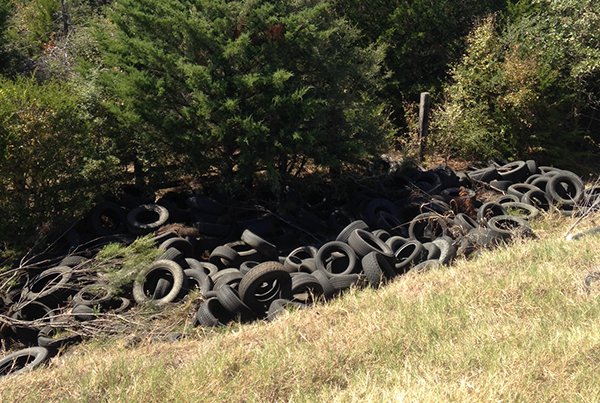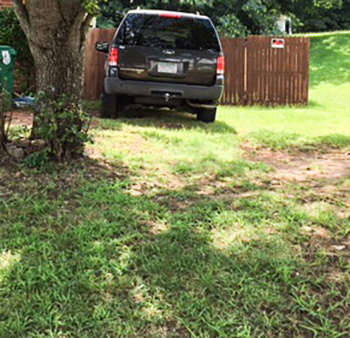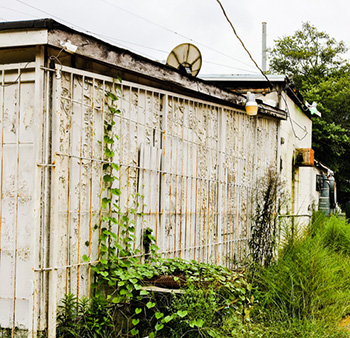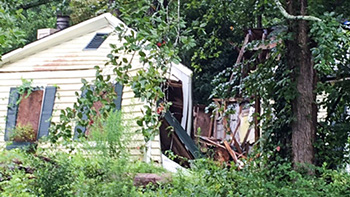
The Code Enforcement Department aims to ensure the City is a clean and beautiful place. Code Enforcement is responsible for enforcing codes which address health and safety issues, including regulations related to rubbish, debris, attractive nuisances, removal of vegetation, zoning, and inoperable vehicles on private property.
The Department strives to optimize all available resources to foster positive relationships between Stonecrest residents, businesses, and industry stakeholders. This will be accomplished by voluntary compliance through various outreach methods, liaison opportunities, clearly defined code standards, and appropriate enforcement actions, both proactively and in response to citizen requests. The goal is to improve and stabilize neighborhoods, protect property values, and promote a healthier and safer environment.
Duties of code enforcement officers include responding to complaints and violations of the following:
- Improperly parked, unlicensed, and inoperable vehicles on private property
- Recreational or specialized vehicles within residential districts
- Zoning issues
- Weed abatement
- Health and safety issues
- Noise complaints on general or landscape contractors
- Property maintenance related to overgrown plants, outside storage, and trash and debris
Code enforcement officers document incidents for possible litigation and educate the public through personal contact and published material. Officers also issue warnings and, as a last resort, citations, for violations.
- The Code Enforcement Department receives complaints via online forms, telephone, email, postal mail, and in-person at the city hall.
- Once the complaint has been received, the claim is logged into our case management system known as CitizenServe.
- The case is assigned to an officer for an inspection related to the complaint.
- The officer inspects within 48 hours of receipt.
- Once the inspection has been completed on the property, all violations are identified, if found, a Notice of Violation is provided to the owner, tenant, or anyone who has legal control and custody of the property. The notice usually allows for seven days from the initial inspection for compliance, but extensions can be granted for circumstances which should be warranted if the responsible party contacts the officer to request such an extension.
- Once the extension and/or compliance date has passed, another reinspection is conducted. If the property remains in violation, a citation to appear in the City of Stonecrest Municipal Court will be written to all parties, including the property owner, if needed.
- Once a citation is issued to the violator, they are required to appear in the City of Stonecrest Municipal Court.
Animal Enforcement
DeKalb County Animal Enforcement Services (DCAES) is managed by the DeKalb County Public Safety division. DCAES provides care, education, and protection services for animals in the fight against cruelty, while enforcing County ordinances and state animal-related laws.
To request service, call (404) 294-2996 Ext. 2 or submit the Animal Service Request form online.
Examples of Violations

Parking on the lawn

Peeling paint and weeds on buildings

Structural damage
FAQ
Can I remain anonymous when reporting a code enforcement violation?
Yes. We do not require that you provide any personal information. Remember that all information you provide to the city, including names, phone numbers, or email addresses, is subject to the open records laws. In other words, we must provide this information to anyone who asks for it. If you wish to remain completely anonymous, do not provide your personal information.
What's next if I've received a notice of violation from Code Enforcement
If you have any questions about what is required of you to achieve compliance with City of Stonecrest Code Enforcement Department, please contact the officer assigned to your case. The officer's name is listed on the bottom of the notice you received. You can also call our main number at (770) 224-0200 and speak to anyone in the Code Enforcement Department.
Who is responsible for maintaining the appearance of our right-of-way?
Stonecrest code enforcement officers will be responsible for the removal of illegal signs and small debris. Lawn maintenance, including tree and shrubbery trimming, will still be maintained by DeKalb County.
How serious is illegal dumping?
In Georgia, there are two laws – one for littering, and one for illegal dumping - and they are pretty tough.
In 1993, the General Assembly established fines and possible jail terms for individuals and companies caught illegally disposing of litter and waste. Violators can even be ordered to clean up and repair areas contaminated by their carelessness. The laws appear under Georgia’s Criminal Code (O.C.G.A. ¤16-7-40 et seq. and 16-7-50 et seq.) and the state’s 30,000 peace officers, including the Department of Natural Resources’ Environmental Enforcement Unit, have been charged with their enforcement.
Definitions
The State’s Litter and Waste Control Laws distinguish between litter and waste essentially as follows: improperly discarded items exceeding ten pounds or 15 cubic feet in volume (about the size of a residential garbage can) are classified as waste; all other such items are classified as litter. Examples of both include cans, bottles, boxes, papers, dead animals, sand, gravel, and household garbage.
Again, in bulk, these items are considered to be waste and in smaller amounts, litter. Other waste types include discarded appliances, machinery, tires, junked cars, batteries, construction materials, biomedical waste, hazardous substances and hazardous waste.
Prohibited Activities
In Georgia, it is illegal to:
- Leave litter or dump waste on any public or private property, including highways, streets, alleys, parks, lawns, fields and forests.
- Leave litter or dump waste on any public or private waters, including fresh water lakes, streams, canals, rivers, and tidal or coastal waters.
These activities are not prohibited if:
- The property on which the litter or waste is placed is a designated disposal facility.
- The litter or waste is placed in a trash receptacle in or on the property in question.
- The property owner has given permission for the litter or waste to be placed on the property and the litter or waste does not pose a threat to the public health or welfare.
Common Violations
Some examples of how people violate Georgia’s Litter and Waste Control Laws are:
- Throwing litter out of a car or boat
- Abandoning old cars or used tires on public property;
- Hauling trash for profit and dumping it somewhere other than a designated disposal facility; and
- Pouring used motor oil, antifreeze or other pollutants into storm drains or manholes.
Penalties
Anyone caught littering in Georgia can be charged with a misdemeanor, and if found guilty, can be punished by a fine of not less than $100 and not more than $1,000. The law also allows the court to direct the violator to clean up the littered area and to publish the violator’s name in the newspaper.
Anyone caught illegally dumping less than 500 pounds of waste can be charged with a misdemeanor and can be fined accordingly. Each day a continuing violation occurs is considered a separate violation. Dumping more than 500 pounds is considered a misdemeanor on the first offense. A second conviction is a felony. The penalty for a second conviction is a fine of up to $25,000 or a prison sentence of up to two years (or both).
Anyone caught illegally dumping biomedical or hazardous waste, or dumping for commercial purposes, can be found guilty of a felony. If convicted, the violator can be fined up to $25,000 and sentenced to two years in prison.
What you can do to help?
Although enforcing Georgia’s Litter and Waste Control Laws is the responsibility of local and state law enforcement officers, there are a number of ways citizens can help cut down on littering and illegal dumping.
FIRST, don’t become part of the problem yourself.
Many people don’t realize that some of the things they do every day may lead to litter. For example, transporting debris in the back of a truck without a tarp will likely result in the debris blowing onto the side of the road and becoming litter.
Similarly, placing unsecured waste at the curb for collection invites animals, or even the wind, to scatter debris along the street. A little prevention goes a long way. You can help by always disposing of litter properly. Never throw trash directly into a dumpster-place it in a bag and secure it before tossing. And always secure cargo with a tarp or other cover before taking it on the road.
SECOND, get involved in community efforts.
Participate in volunteer clean-ups, such as the annual “Let’s Keep Georgia Peachy Clean” statewide clean-up or local Keep America Beautiful Program activities.
Join the Georgia Department of Transportation’s Adopt-A-Highway Program or the Georgia Department of Natural Resources Adopt-A-Stream Program.
Spread the word to friends and neighbors that illegal dumping is a crime.
Invite local and state law enforcement officials to speak to neighborhood associations and civic groups about Georgia’s Litter and Waste Control Laws and illegal dumping problems in your community.
Write or call local elected officials and let them know your concerns about littering and illegal dumping.
Encourage community and business leaders to provide and maintain trash receptacles where they are needed.
THIRD, get to know Georgia’s laws.
Contact your local law enforcement agency to report violations. With the public’s help, law enforcement and justice officials can more effectively use these laws to prosecute dumping violators and work toward cleaning up the environment.
Landlord-Tenant Information
Georgia Landlord-Tenant Handbook
|